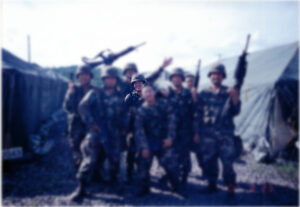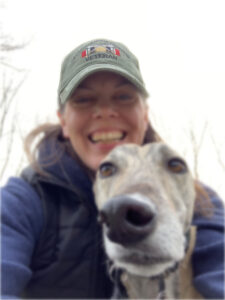Keeping My Identity as a Veteran
 I have always identified myself as a veteran. Recently I was reading a news post that the Department of the Interior will be granting free access to veterans and Gold Star Families to national parks, and other areas are starting this veterans day and from now on. They have already provided free annual passes to active duty military and free entrance for veterans and others on specific holidays.
I have always identified myself as a veteran. Recently I was reading a news post that the Department of the Interior will be granting free access to veterans and Gold Star Families to national parks, and other areas are starting this veterans day and from now on. They have already provided free annual passes to active duty military and free entrance for veterans and others on specific holidays.
My husband said that he could get into the national parks as he is still in the military. My counterpoint was that I could not because they did not, up until now, extend the free admission to veterans. Oh, yes, you can, he says, you have a dependent ID card. I looked at him, scrunched my face, and said, yes, but I don’t identify that way. In my heart, I am a veteran, not a dependent spouse.
Not that there is anything wrong with being a spouse or dependent, mind you. The backbones of the military are the spouses and dependents. They are the ones that keep everything going. But for me, I was in the military and had gotten out years before I met my husband; I identify as a veteran first. I do not foresee anything happening that will change that. I will always see myself as a veteran.
Veterans Are Women Too
I am adamant about keeping my identity on my veteran status and not being a spouse or dependent because no one ever thinks I am. I mean, you can’t tell who is a veteran just by looking at them. Assuming that someone couldn’t be or wouldn’t be because of their gender or color of their skin or religion is merely ridiculous, but that doesn’t stop people from making those assumptions.
It is the assumption that I am not a veteran because I am a woman. Once people get past that and realize that I was in the military, then there are the other assumptions. That I was there to find a husband is a common one. Not me specifically, but women overall. Another one is that we aren’t there to be soldiers. I was told by my squad leader at my first duty station that women in the Army are good for three things, morale, welfare, and recreation. I am going to let that sit with you a moment.
There is still a smaller percentage of women in the military than there are men. It is always a man’s world by sheer numbers. The traditions that have developed over hundreds of years make it hard for women. As of 2018, 16.3% of the Department of Defense Armed Services were women. That number has been steadily increasing, and I see no reason that eventually, women will become more common in the military. It will take time, and there have been some changes, and there is still more to be done.
Separate but Equal
The roles of women are changing. For one, women can be in direct combat roles. I could not do that, and it wasn’t that the people around me thought I couldn’t; I was not allowed to simply because of my gender. It was because of my gender that I chose my specialty. When I enlisted, I did not select an occupation that would keep me at a desk. Nope, I joined the military police. It was the closest that I could get to being in a direct combat role. And I had history to back up my theory.
In 1989 Military Police Captain Linda L Blair lead her troops in that military operation in Panama. It was a big deal back then, and it still is, although that was forty years ago that CPT Blair did what any officer would have done, she leads her soldiers. And she wasn’t the only female on the ground that day. There were other military policewomen, women in support units; they were all there.
I joined in the summer of 2000, and I thought for sure the attitude would have shifted. It did not. I was in the minority still. It got more interesting when I got to my first duty station. When we went to the field, I could not sleep in the same tent with my platoon simply because I was female. I felt the confusion when a sergeant told me that I could not stay in the tent with my platoon, my soldier peers.
It was especially detrimental because I was the only female in the platoon. And so I gathered up my stuff and went to the support tent. I was supposed to be a soldier first, and I wholeheartedly embraced that concept, as did the other soldiers. The leadership did not see it that way, so I was a soldier first until my femaleness separated me. Separate but equal strikes again.
Soldier First
Overall, the Army told me with their policies and attitudes that I could not do certain things because of my gender. The good (?) thing is that my mother had been telling me that most of my life. The military, well, it was a message that I was very familiar to me. The military’s attitude towards women made me dig my heels in and push forward anyway. Tell me that I can’t do anything and I will show you that I can.
It wasn’t easy, and I didn’t always succeed. I did things to ensure that they saw me as a peer. I worked harder than others so that I would not be considered that slacker female. I did engage in making fun of other female soldiers for not being able to do stuff. I admit that, and I was wrong to do that. I was trying to fit in and forge a path forward. I stepped on people along the way, pushed them down so that I would appear to stand taller. I know now that was not the way to do that. I thought differently about a lot of things then.
One of the things that I thought then that I still struggle with is how to gain equality. Equality does not come without having to show that you belong there. It shouldn’t, but it does. At least that is what history has shown us. And unfortunately, in a world where the males make the rules, you have to join their game and follow their rules. Then, when they least expect it, beat them at their own game. That was what I thought. I was one little cog trying to get the colossal machine to shift. Was I destined to fail? Maybe. But while I was there, I tried.
Wearing My Veteran Status
 I was with my husband at the PX (Post Exchange – it’s like Target or Wal-Mart for the military) helping him get items for his deployment. As we walked around clothing and sales I saw a hat and I had a moment of clarity. Across the hat was written ‘Operation Iraqi Freedom Veteran.’ On the bill was written ‘VET.’
I was with my husband at the PX (Post Exchange – it’s like Target or Wal-Mart for the military) helping him get items for his deployment. As we walked around clothing and sales I saw a hat and I had a moment of clarity. Across the hat was written ‘Operation Iraqi Freedom Veteran.’ On the bill was written ‘VET.’
I walked by that hat thinking that I don’t see women veterans wearing hats that identify them as veterans. I was not planning on purchasing that hat either. Something tugged at me as we waited in line. I ran over to that hat, grabbed it, and added it to our cart. I wear that hat almost every day. And I have met other female veterans because of my hat too.
I still feel weird wearing that hat. Not because I am not proud of what I accomplished because I am not trying to draw attention to myself. Not at all, the attention that I get wearing the hat makes me uncomfortable. I am not wearing it for me. I am wearing it to remind people that women are veterans. And for the future generation that may have never seen or met a female veteran.
I also wear my hat as a reminder that all of us who came before may not have seen the changes that we fought for, but I hope that we all remember that we continued the fight. I am humbled to know that I was there to lay down a brick for the next generation to build upon. Every single journey really does begin with that first, small step.
Awareness
On average, twenty-two veterans end their lives everyday. Veterans are 1.5 times more likely to die by suicide than Americans who never served in the military. For female veterans, the risk factor is 2.2 times more likely.
If you or someone you know is struggling, please reach out, or have them reach out, to the Veteran Crisis Line

0 Comments